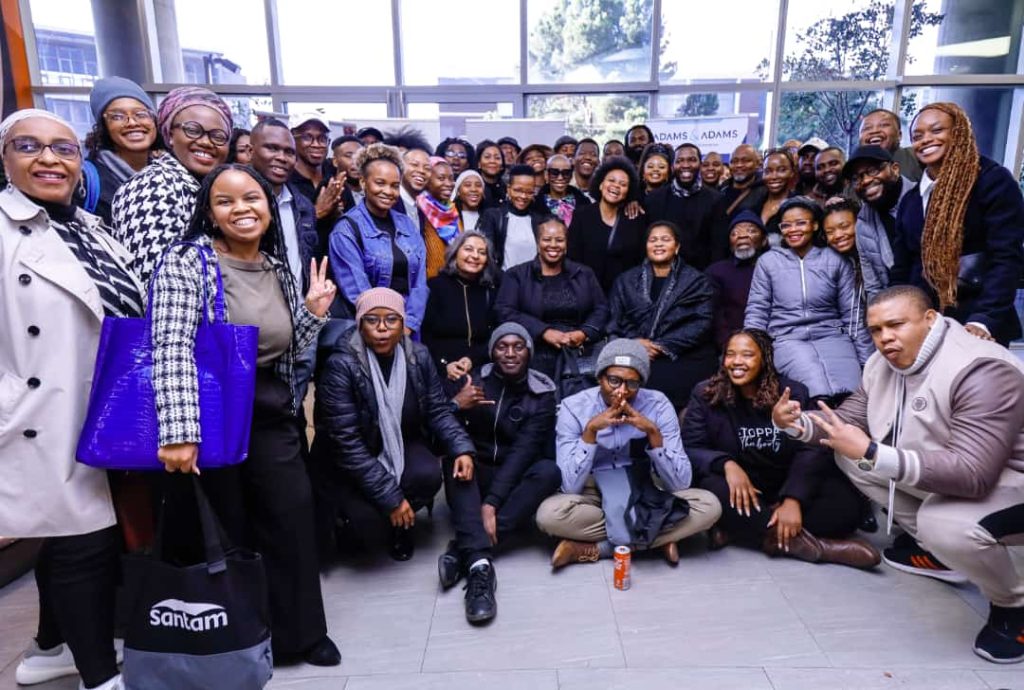Download your Magazine copy here
On June 12th, the prestigious law firm Bowmans hosted a pioneering legal workshop organized by Lawyers for Arts South Africa (LASA). Supported by Adams & Adams, Santam, and Steenberg Wine Farm, this event marked a significant milestone in the intersection of law and the creative arts. With a focus on empowering artists through legal knowledge, the workshop featured insightful sessions from industry experts and concluded with a networking event sponsored by Steenberg Wines farm. The workshop commenced with a welcome address by LASA’s co-founder Tandai, who highlighted the mission of LASA in fostering sustainable careers and economic development within the arts. Tandai emphasized the importance of artists organizing themselves and equipping themselves with professional skills to navigate the complex landscape of the creative industry. The keynote address was delivered by Judge Mali, LASA’s jurisprudential mother, whose speech set the tone for the workshop. Judge Mali spoke passionately about the judiciary’s role in supporting the creative industry, asserting that the arts and culture sector in South Africa is a billion-dollar industry. She emphasized the necessity for artists to influence legislation actively, using the judiciary’s role in law-making as a pivotal example. Judge Mali cited the Imbube case to illustrate how legal frameworks such as copyright, patent, and labour laws can protect and benefit artists. Her message was clear: the arts are not merely a pastime but a serious profession and a vital component of the economy. Adams & Adams, represented by Partner Lita Miti Qamata and Senior Associate Anielle Van Deventer, provided an in-depth session on intellectual property (IP) rights. Their presentation covered the various forms of IP—patents, trademarks, designs, and copyrights—
essential knowledge for any artist looking to protect their work. They delved into the specifics of section 12 of the Copyright Act, which allows certain acts of reproduction without permission, highlighting the concept of fair use. The session also detailed the types of works protected under copyright law, including literary, musical, artistic, and cinematographic works, as well as sound recordings and broadcasts. Qamata and Van Deventer stressed that the author is the initial owner of the copyright and discussed the intricacies of digital rights management and social media. They concluded with an overview of the remedies available for IP infringement and the legislative framework supporting the arts and culture fraternity. Their session was lauded for its thoroughness and practicality, providing artists with valuable tools to safeguard their creations. Insurance, often overlooked in the arts sector, was brought to the forefront by Lehlohonolo Tau from Santam. Tau underscored the critical importance of insurance, describing it not as a luxury but as a necessity for artists. He introduced Santam Switch, an innovative product designed to insure equipment while on duty, thereby offering tailored protection for creatives.
Tau also highlighted the role of brokers as experts in securing the best insurance deals, ensuring artists are adequately covered against potential risks. This session resonated with many attendees who acknowledged the often precarious nature of their work and the need for robust financial safeguards. Associates Relebohile and Keabetshwe from Bowmans provided a comprehensive overview of the legalities involved in running a business. Their presentation covered the Memorandum of Incorporation (MOI), the incorporation of different types of companies, and the fiduciary duties of directors.
They explained the business judgment rule and common law liabilities, emphasizing the principle of corporate governance. This session was particularly beneficial for artists looking to formalize their creative endeavors into structured business entities. The detailed insights into corporate governance and director responsibilities equipped attendees with the knowledge to navigate the business side of their artistic careers effectively. The day concluded with a relaxed networking session, generously sponsored by Steenberg Wine Farm. Guests enjoyed an array of fine wines, providing an ideal setting for artists and legal professionals to connect and discuss the day’s learnings. This closing event underscored the importance of community and collaboration within the arts sector. LASA’s first legal workshop for creative artists was an unequivocal success, offering a wealth of information and resources to its attendees. The support from Bowmans, Adams & Adams, Santam, and Steenberg Wine Farm highlighted the collaborative effort required to empower the arts through legal education. Judge Mali’s keynote speech, the detailed sessions on intellectual property, business legalities, and insurance, combined with the networking opportunities, made this workshop an invaluable experience for all who attended. The event not only underscored the importance of legal knowledge in the creative industry but also fostered a sense of solidarity and support among South African artists. LASA has set a high standard for future workshops, demonstrating a clear commitment to nurturing and protecting the creative community through legal advocacy and education.

Empowering artists with legal knowledge—essential for creative success!